小学五年级英语下册知识点归纳总结(最新最全)
- 格式:doc
- 大小:46.54 KB
- 文档页数:4
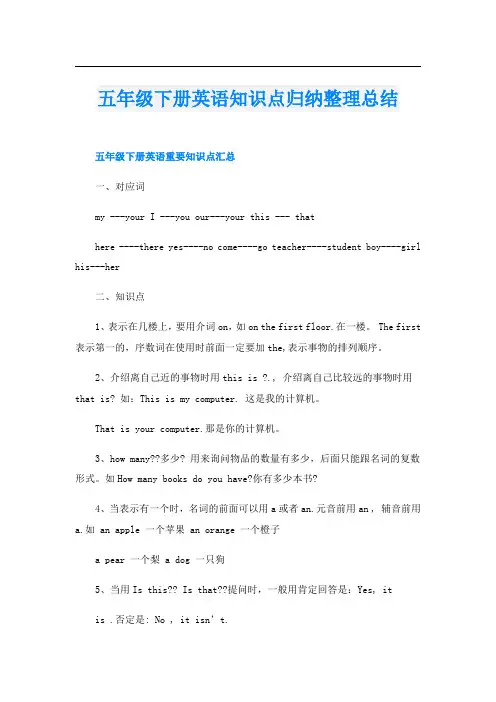
五年级下册英语知识点归纳整理总结五年级下册英语重要知识点汇总一、对应词my ---your I ---you our---your this --- thathere ----there yes----no come----go teacher----student boy----girl his---her二、知识点1、表示在几楼上,要用介词on,如on the first floor.在一楼。
The first 表示第一的,序数词在使用时前面一定要加the,表示事物的排列顺序。
2、介绍离自己近的事物时用this is ?., 介绍离自己比较远的事物时用that is? 如:This is my computer. 这是我的计算机。
That is your computer.那是你的计算机。
3、how many??多少? 用来询问物品的数量有多少,后面只能跟名词的复数形式。
如How many books do you have?你有多少本书?4、当表示有一个时,名词的前面可以用a或者an.元音前用an , 辅音前用a.如 an apple 一个苹果 an orange 一个橙子a pear 一个梨 a dog 一只狗5、当用Is this?? Is that??提问时,一般用肯定回答是:Yes, itis .否定是: No , it isn’t.三、句子:1、This is the teacher’s office.这是老师办公室。
2、That is my classroom.那是我的教室。
3、Go to the library. Read a story-book..去图书馆。
读故事书。
4、Is this the library? Yes, it is.这是图书馆吗?是的。
5Is that the art room? The art room is on the second floor.那是美术室吗?不是,美术室在二楼。
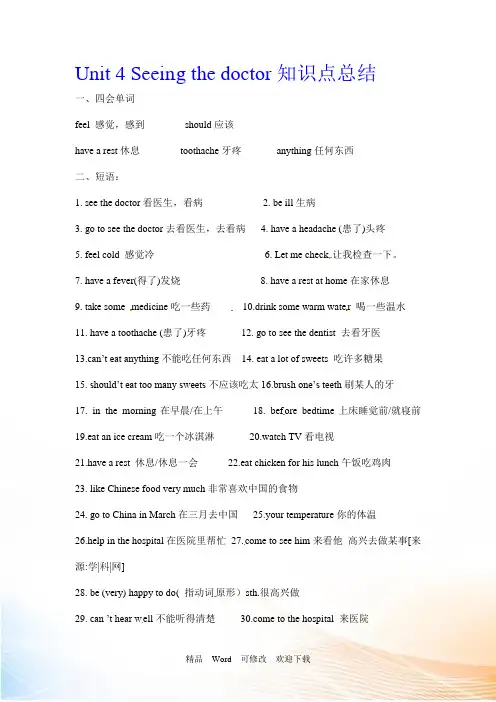
Unit 4 Seeing the doctor知识点总结一、四会单词feel 感觉,感到should应该have a rest休息toothache牙疼anything任何东西二、短语:1. see the doctor看医生,看病2. be ill生病3. go to see the doctor去看医生,去看病4. have a headache (患了)头疼5. feel cold 感觉冷6. Let me check.让我检查一下。
7. have a fever(得了)发烧8. have a rest at home在家休息9. take some medicine吃一些药10.drink some warm wate r 喝一些温水11. have a toothache (患了)牙疼12. go to see the dentist 去看牙医13.can’t eat anything不能吃任何东西14. eat a lot of sweets 吃许多糖果15. should’t eat too many sweets不应该吃太16.brush one’s teeth刷某人的牙17. in the morning在早晨/在上午18. bef ore bedtime上床睡觉前/就寝前19.eat an ice cream吃一个冰淇淋20.watch TV看电视21.have a rest 休息/休息一会22.eat chicken for his lunch午饭吃鸡肉23. like Chinese food very much非常喜欢中国的食物24. go to China in March在三月去中国25.your temperature你的体温26.help in the hospital在医院里帮忙e to see him来看他高兴去做某事[来源:学|科|网]28. be (very) happy to do( 指动词原形)sth.很高兴做29. can ’t hear w ell不能听得清楚e to the hospital 来医院31. point at his long neck 指着他的长脖子多糖果32. My neck hurts.我的脖受伤了。
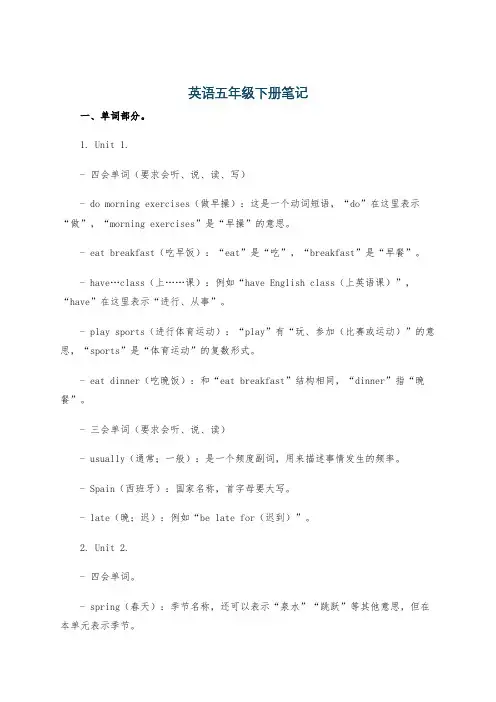
英语五年级下册笔记一、单词部分。
1. Unit 1.- 四会单词(要求会听、说、读、写)- do morning exercises(做早操):这是一个动词短语,“do”在这里表示“做”,“morning exercises”是“早操”的意思。
- eat breakfast(吃早饭):“eat”是“吃”,“breakfast”是“早餐”。
- have…class(上……课):例如“have English class(上英语课)”,“have”在这里表示“进行、从事”。
- play sports(进行体育运动):“play”有“玩、参加(比赛或运动)”的意思,“sports”是“体育运动”的复数形式。
- eat dinner(吃晚饭):和“eat breakfast”结构相同,“dinner”指“晚餐”。
- 三会单词(要求会听、说、读)- usually(通常;一般):是一个频度副词,用来描述事情发生的频率。
- Spain(西班牙):国家名称,首字母要大写。
- late(晚;迟):例如“be late for(迟到)”。
2. Unit 2.- 四会单词。
- spring(春天):季节名称,还可以表示“泉水”“跳跃”等其他意思,但在本单元表示季节。
- summer(夏天):注意其发音,字母“u”发/ʌ/音。
- autumn(秋天):也可以说“fall”,尤其在美国英语中。
- winter(冬天):这四个季节单词是描述天气和季节相关话题的基础词汇。
- season(季节):是一个可数名词,复数形式是“seasons”。
- 三会单词。
- picnic(野餐):常和“have a picnic(去野餐)”搭配使用。
- go on a picnic(去野餐):这是一个常用短语。
- pick(摘;采集):例如“pick apples(摘苹果)”。
- pick up(捡起;拾起):有不同的含义,在这里是“捡起”的意思。
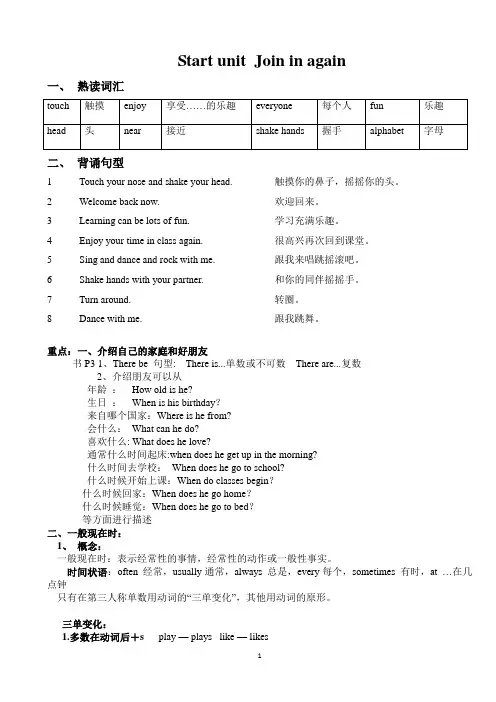
Start unit Join in again一、熟读词汇二、背诵句型1 Touch your nose and shake your head. 触摸你的鼻子,摇摇你的头。
2 Welcome back now. 欢迎回来。
3 Learning can be lots of fun. 学习充满乐趣。
4 Enjoy your time in class again. 很高兴再次回到课堂。
5 Sing and dance and rock with me. 跟我来唱跳摇滚吧。
6 Shake hands with your partner. 和你的同伴摇摇手。
7 Turn around. 转圈。
8 Dance with me. 跟我跳舞。
重点:一、介绍自己的家庭和好朋友书P3 1、There be 句型: There is...单数或不可数There are...复数2、介绍朋友可以从年龄:How old is he?生日:When is his birthday?来自哪个国家:Where is he from?会什么:What can he do?喜欢什么: What does he love?通常什么时间起床:when does he get up in the morning?什么时间去学校:When does he go to school?什么时候开始上课:When do classes begin?什么时候回家:When does he go home?什么时候睡觉:When does he go to bed?等方面进行描述二、一般现在时:1、概念:一般现在时:表示经常性的事情,经常性的动作或一般性事实。
时间状语:often 经常,usually通常,always 总是,every每个,sometimes 有时,at …在几点钟只有在第三人称单数用动词的“三单变化”,其他用动词的原形。

Unit Welcome to our school!一、核心词汇1.名词music音乐way路;道路library图书馆2.代词we我们our我们的3.动词meet相遇;开会welcome欢迎have有like喜欢4.其他all所有;全部many许多also也;同样very much非常please请二、拓展词汇1.动词borrow(向某人、从某人)借2.短语science lesson科学课English lesson英语课meeting room会议室science lab科学实验室language lab语言实验室art club美术(艺术)俱乐部music club音乐俱乐部borrow books借书have a meeting开会paint a picture(用颜料)绘画play the piano弹钢琴三、核心句型1. Welcome to our school! 欢迎来到我们学校!解读:这是一个迎接宾客的礼貌用语,是一个祈使句,其后跟地点名词。
举一反三: Welcome to our city! 欢迎来到我们城市!Welcome to China! 欢迎来到中国!2. We often borrow books from the library. 我们经常从图书馆里借书。
解读:这是一个描述某人经常做某事的句型。
举一反三: They often borrow some English books from Beijing Library. 他们经常从北京图书馆里借一些英语书。
3. —How many English lessons do you have in a week? 你们一周有多少节英语课?—We have three. 我们有三节。
解读:这是用来询问对方有多少节课的句型。
举一反三: —How many PE lessons do you have in a week? 你们一周有多少节体育课?—We have five. 我们有五节。
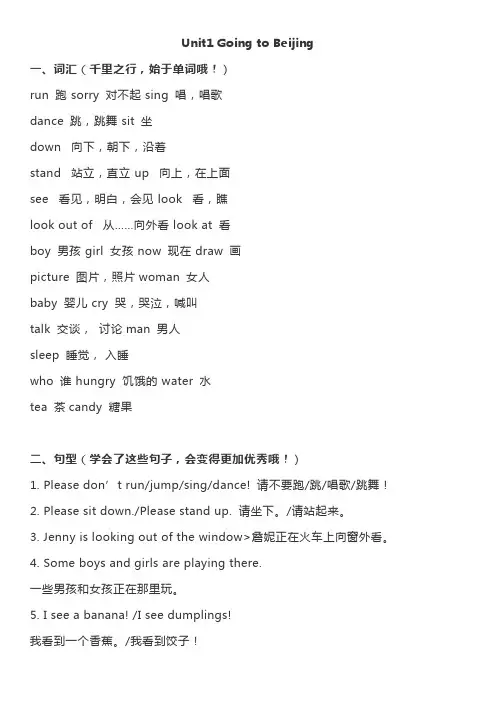
Unit1 Going to Beijing一、词汇(千里之行,始于单词哦!)run 跑 sorry 对不起 sing 唱,唱歌dance 跳,跳舞 sit 坐down 向下,朝下,沿着stand 站立,直立 up 向上,在上面see 看见,明白,会见 look 看,瞧look out of 从……向外看 look at 看boy 男孩 girl 女孩 now 现在 draw 画picture 图片,照片woman 女人baby 婴儿 cry 哭,哭泣,喊叫talk 交谈,讨论man 男人sleep 睡觉,入睡who 谁 hungry 饥饿的 water 水tea 茶candy 糖果二、句型(学会了这些句子,会变得更加优秀哦!)1. Please don’t run/jump/sing/dance! 请不要跑/跳/唱歌/跳舞!2. Please sit down./Please stand up. 请坐下。
/请站起来。
3. Jenny is looking out of the window>詹妮正在火车上向窗外看。
4. Some boys and girls are playing there.一些男孩和女孩正在那里玩。
5. I see a banana! /I see dumplings!我看到一个香蕉。
/我看到饺子!6. A: Are you singing, Jenny? 你在唱歌吗,詹妮?B: No, I’m not. 不,我没有。
7. A:Who is talking? 谁在说话?B: Danny is talking. 詹妮正在说话。
8. The baby is sleeping now. 婴儿在睡觉。
9. A: Who is hungry? 谁饿了?B: I’m hungry! 我饿了!10. A: Would you like some fruit? 你想要一些水果吗?B: Yes, please. I’d like an apple and an orange, Mrs. Li.是的。
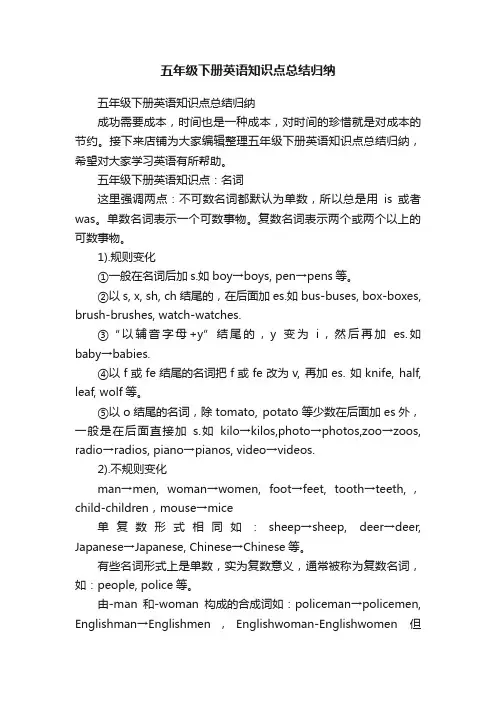
五年级下册英语知识点总结归纳五年级下册英语知识点总结归纳成功需要成本,时间也是一种成本,对时间的珍惜就是对成本的节约。
接下来店铺为大家编辑整理五年级下册英语知识点总结归纳,希望对大家学习英语有所帮助。
五年级下册英语知识点:名词这里强调两点:不可数名词都默认为单数,所以总是用is或者was。
单数名词表示一个可数事物。
复数名词表示两个或两个以上的可数事物。
1).规则变化①一般在名词后加s.如boy→boys, pen→pens等。
②以s, x, sh, ch结尾的,在后面加es.如bus-buses, box-boxes, brush-brushes, watch-watches.③“以辅音字母+y”结尾的,y变为i,然后再加es.如baby→babies.④以f或fe结尾的名词把f或fe改为v, 再加es. 如knife, half, leaf, wolf等。
⑤以o结尾的名词,除tomato, potato等少数在后面加es外,一般是在后面直接加s.如kilo→kilos,photo→photos,zoo→zoos, radio→radios, piano→pianos, video→videos.2).不规则变化man→men, woman→women, foot→feet, tooth→teeth,,child-children,mouse→mice单复数形式相同如:sheep→sheep, deer→deer, Japanese→Japanese, Chinese→Chinese等。
有些名词形式上是单数,实为复数意义,通常被称为复数名词,如:people, police等。
由-man和-woman构成的合成词如:policeman→policemen, Englishman→Englishmen,Englishwoman-Englishwomen但German不是合成词,故复数形式为Germans.另外被man 或woman 修饰的'名词变复数时,两个名词都要变。
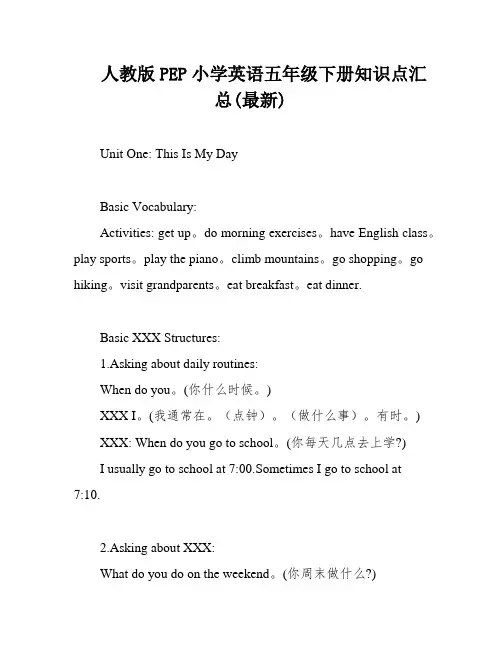
人教版PEP小学英语五年级下册知识点汇总(最新)Unit One: This Is My DayBasic Vocabulary:Activities: get up。
do morning exercises。
have English class。
play sports。
play the piano。
climb mountains。
go shopping。
go hiking。
visit grandparents。
eat breakfast。
eat dinner.Basic XXX Structures:1.Asking about daily routines:When do you。
(你什么时候。
)XXX I。
(我通常在。
(点钟)。
(做什么事)。
有时。
)XXX: When do you go to school。
(你每天几点去上学?)I usually go to school at 7:00.Sometimes I go to school at7:10.2.Asking about XXX:What do you do on the weekend。
(你周末做什么?)XXX I。
(我通常/经常。
有时。
)XXX: What do you do on the weekend?I often play XXX I go shopping with my mom.3.Introducing one's own habits:Every weekend。
I go hiking。
(我每个周末远足。
)Every day。
I do my homework at 8:00 in the evening。
(我每天晚上8点做作业。
)4.Asking XXX:What do you do。
(你是干什么的?)Time:morning。
afternoon。
evening。
noon。
at night。
6:00.on Sunday。
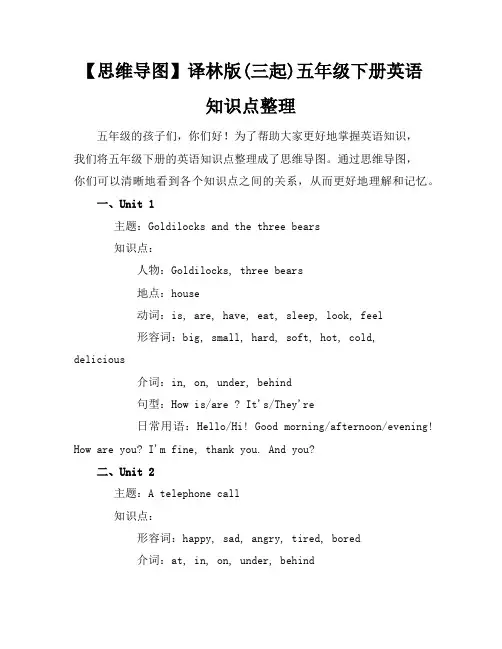
【思维导图】译林版(三起)五年级下册英语知识点整理五年级的孩子们,你们好!为了帮助大家更好地掌握英语知识,我们将五年级下册的英语知识点整理成了思维导图。
通过思维导图,你们可以清晰地看到各个知识点之间的关系,从而更好地理解和记忆。
一、Unit 1主题:Goldilocks and the three bears知识点:人物:Goldilocks, three bears地点:house动词:is, are, have, eat, sleep, look, feel形容词:big, small, hard, soft, hot, cold,delicious介词:in, on, under, behind句型:How is/are ? It's/They're日常用语:Hello/Hi! Good morning/afternoon/evening! How are you? I'm fine, thank you. And you?二、Unit 2主题:A telephone call知识点:形容词:happy, sad, angry, tired, bored介词:at, in, on, under, behind句型:What can/can't do? can/can't日常用语:Can you ? Yes, I can./No, I can't. What are you doing? I'm三、Unit 3主题:Asking the way知识点:名词:road, street, park, cinema, library, museum介词:to, from, on, in, at句型:Where is/are ? It's/They're日常用语:Excuse me. How can I get to ? Go straight along and turn at It's about metres/metres from here.四、Unit 4主题:Road safety知识点:动词:is, are, have, can, must, may, should名词:road, street, traffic lights, crossing, zebra, sign介词:on, in, at, near句型:You must/may/should You can't日常用语:Look left/right. Cross the road. Be careful.五、Unit 5主题:A PE lesson动词:is, are, have, can, do, play, jump, run名词:PE, class, teacher, student, ball, net介词:in, at, on, under, over句型:What are you doing? I'm日常用语:Let's ! Come on! Well done!六、Unit 6主题:An interesting country知识点:动词:is, are, have, can, go, visit, see, do名词:country, city, town, village, mountain,river介词:in, at, on, under, behind日常用语:Hello! How are you? I'm fine, thank you. And you?七、Unit 7主题:A busy day知识点:名词:day, week, month, year, school, home, park介词:in, at, on, under, behind句型:What do you do on ? I日常用语:What time do you get up? I get up at八、Unit 8主题:At the weekends动词:is, are, have, can, go, visit, see, do名词:weekend, park, cinema, library, museum, shop介词:in, at, on, under, behind句型:What do you do at the weekends? I日常用语:Let's go to ! I'd like to Can we ? Yes, we can./No, we can't.九、Unit 9主题:Chinese festivals知识点:动词:is, are, have, can, go, visit, see, do名词:festival, Spring Festival, MidAutumn Festival, Dragon Boat Festival介词:in, at, on, under, behind句型:What do you do at ? I日常用语:Happy New Year! Happy MidAutumn Festival! Happy Dragon Boat Festival!十、Unit 10主题:Review and check知识点:复习前面所学知识点十一、五年级的孩子们,通过思维导图,你们可以更好地掌握五年级下册的英语知识点。
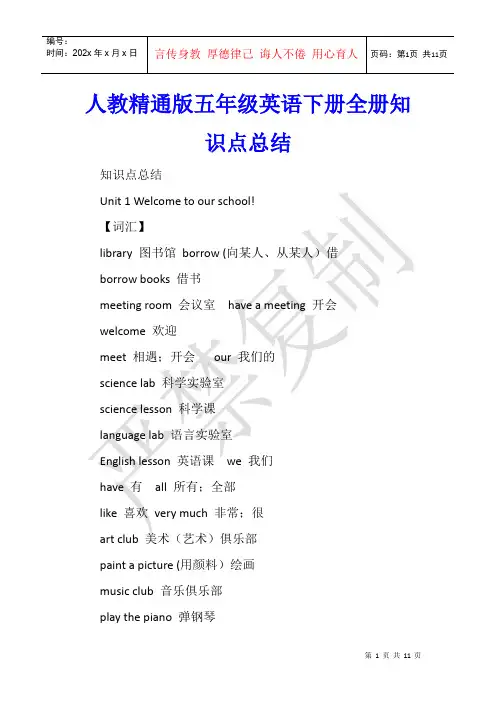
人教精通版五年级英语下册全册知识点总结知识点总结Unit 1 Welcome to our school!【词汇】library 图书馆borrow (向某人、从某人)借borrow books 借书meeting room 会议室have a meeting 开会welcome 欢迎meet 相遇;开会our 我们的science lab 科学实验室science lesson 科学课language lab 语言实验室English lesson 英语课we 我们have 有all 所有;全部like 喜欢very much 非常;很art club 美术(艺术)俱乐部paint a picture (用颜料)绘画music club 音乐俱乐部play the piano 弹钢琴many 许多music 音乐way 路;道路please 请also 也;同样【句型】1. We\\\\\\\\\'ll show you around our school. 我们会带你参观我们学校。
2. Look! This is our library. 看!这是我们的图书馆。
3. —Do you often come to the library?你经常去图书馆吗?—Yes. We often borrow books from the library.是的。
我们经常从图书馆借书。
4. This way, please. This is our meeting room.这边请。
这是我们的会议室。
5. Welcome to our school. 欢迎来到我们学校。
6. —How many science lessons do you have in a week?你们一周有多少实验课?—We have two. 两节。
7. —Do you like English? —Yes. We all like it.你喜欢英语吗?喜欢。
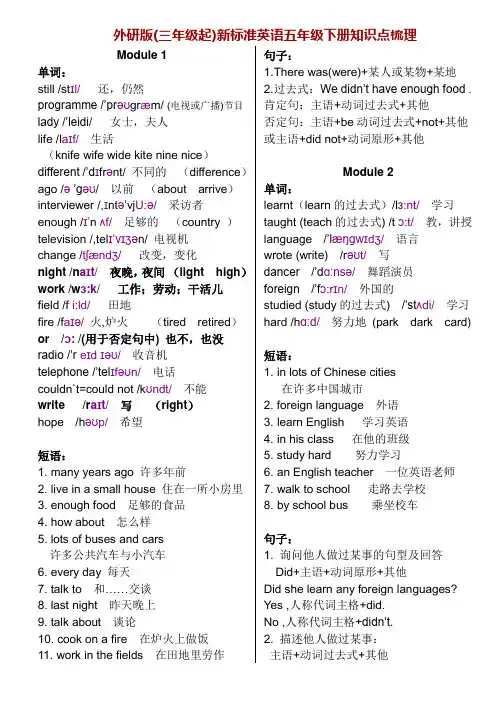
外研版(三年级起)新标准英语五年级下册知识点梳理Module 1单词:still /stɪl/ 还,仍然programme /’prəʊgræm/ (电视或广播)节目lady /’leidi/女士,夫人life /l aɪf/ 生活(knife wife wide kite nine nice)different /’dɪfrənt/ 不同的(difference)ago /ə’gəʊ/ 以前(about arrive)interviewer /,ɪntə’vj U:ə/ 采访者enough /ɪ’nʌf/ 足够的(country )television /,telɪ’vɪʒən/ 电视机change /tʃændʒ/ 改变,变化night /n aɪt/ 夜晚,夜间(light high)work /wɜ:k/ 工作;劳动;干活儿field /f i:ld/ 田地fire /f aɪə/ 火,炉火(tired retired)or /ɔ: /(用于否定句中) 也不,也没radio /’r eɪd ɪəʊ/ 收音机telephone /’telɪfəʊn/ 电话couldn`t=could not /kʊndt/ 不能write /r aɪt/ 写(right)hope /həʊp/ 希望短语:1. many years ago 许多年前2. live in a small house 住在一所小房里3. enough food 足够的食品4. how about 怎么样5. lots of buses and cars许多公共汽车与小汽车6. every day 每天7. talk to 和……交谈8. last night 昨天晚上9. talk about 谈论10. cook on a fire 在炉火上做饭句子:1.There was(were)+某人或某物+某地2.过去式:We didn’t have enough food .肯定句:主语+动词过去式+其他否定句:主语+be动词过去式+not+其他或主语+did not+动词原形+其他Module 2单词:learnt(learn的过去式)/lɜ:nt/ 学习taught (teach的过去式) /tɔ:t/ 教,讲授language /’læŋgwɪdʒ/ 语言wrote (write) /rəʊt/ 写dancer /’dɑ:nsə/舞蹈演员foreign /’fɔ:rɪn/ 外国的studied (study的过去式) /’stʌdi/ 学习hard /hɑ:d/努力地(park dark card)短语:1. in lots of Chinese cities在许多中国城市2. foreign language 外语3. learn English 学习英语4. in his class 在他的班级5. study hard 努力学习6. an English teacher 一位英语老师7. walk to school 走路去学校8. by school bus 乘坐校车句子:1. 询问他人做过某事的句型及回答Did+主语+动词原形+其他Did she learn any foreign languages? Yes ,人称代词主格+did.No ,人称代词主格+didn’t.2. 描述他人做过某事:She learnt English.3.描述他们现在在做某事:主语+be+动词ing+其他He is learning English now .Module 3单词:hamburger /’hæmbəgə/ 汉堡English /’ɪŋglɪʃ/ 英国(式)的breakfast /’brekfəst/早餐,早饭lunch /lʌntʃ/ 午餐,午饭sandwich /’sændwɪtʃ/ 三明治fish and chips/fɪʃtʃɪps/ 炸鱼加炸薯条traditional /trə’dɪʃənəl/ 传统的dish /dɪʃ/ 食品;菜肴gave(give的过去式)/g eɪv/ 给tonight /tə’naɪt/ 今夜,今晚短语:1. very much 很,非常2. an e-mail from Lingling一封来自玲玲的电子邮件4. about English food 关于英国食物5. have an English breakfast吃了一顿英式早餐6. have …for lunch 吃…作为午餐7. a traditional English dinner一顿传统的英式晚餐8. give …to … 把……给……9. at school 在学校句子:1.描述吃过某些食物:主语+ had + 食物名称+ 其他2.询问他人打算吃/喝什么:What are you going to eat/drink ? 3.询问他人三餐吃了什么:What + did + 主语+have+for breakfast / lunch / dinner ?Module 4单词:library /’l aɪbrəri/ 图书馆student /’stj U:dənt/ 学生sent(send的过去式) /sent/ 发送,寄idea /aɪ’dɪə/ 主意,想法put /put/ 放,安放heavy /’hevi/重的,沉的dictionary /’dɪk ʃənəri/ 词典;字典card /kɑ:d/卡片ask /ɑ:sk/邀请wrong /rɒŋ/错误的dear /dɪə/ 哎呀information /,ɪnfə’meɪʃən/ 信息project /’prɒdʒekt/ 项目guide /g aɪd/ 介绍,指南,手册film /fɪlm/ 电影way /w eɪ/方法,方式on关于短语:1. library card 图书卡,借书证2. on Shelf C 在C架上3. as well /æs wel/ 又,还,也句型:1.询问某物在何处及回答的句型:Where are the …about…, please?Where can you find out about …?You can find out … in / on …Module 5单词:light /l aɪt/ 轻的hard /hɑ:d/困难的,费力的department store /dɪ’pɑ:tm əntst ɔ:/百货商店pocket /’pɒkɪt/ 口袋,兜umbrella /ʌm’brelə/ 雨伞sales assistant /s eɪlzə’sɪstənt/售货员,营业员wheel /w i:l/ 轮子easy / i:zi/ 容易的,不费力的take /t eɪk/ 选择要,选择购买too /t U:/ 太,过于try /tr aɪ/ 试,尝试lovely /’lʌli/ 美丽的,可爱的;令人愉快的短语:1. at the department store 在百货商店2. buy you a new one 给你买一个新的3. be easy for you 对你来说很容易4. be too…for…对…来说太…5. take…to… 把…带到…句型:1. 描述事物特征的句型:It’s get……(big反义small,heavy反义light,easy反义hard)2. 表达看法:It’s + 形容词+ for +人称代词宾格Module 6单词:moon /m U:n/ 月亮,月球get /get/ 到达west /west/ 西,西部,西方;向西方parent /p eərənt/ 母亲;父亲;家长stay /st eɪ/ 停留(play day say)July /dʒʊ’laɪ/ 七月south /s aʊθ/南,南部,南方;向南方remember /rɪ’membə/ 记得June / dʒ U:n/ 六月east / i:st/ 东,东部,东方;向东方best /best/ 最好的north /nɔ:θ/北,北部,北方;向北方rest /rest/ 休息rode(ride的过去式)/rəʊd/ 骑短语:1. have a rest 休息一下2. of course 当然3. in the west of China 在中国的西部4. go there 去那儿5. last year 去年6. stay with 和……呆在一起7. in July 在七月8. every year 每年9. Li people 黎族人10. ride a horse 骑马句型:1.用方位词表达地点:It’s in the north / south / east / west of…Module 7单词:evening /‘ɪvənɪŋ/傍晚,晚上late /l eɪt/近日暮的;近深夜的;时间不早的worker /’wɜ:kə/ 工人factory /’f æktəri/ 制造厂;工厂early /’ɜ:li/ 早的taxi /’t æksɪ/ 出租车,计程车quarter /’kwɔ:tə/ 一刻钟to(距整点)差......worry /’wʌri/ 焦虑,担心短语:1. go to work 上班2. be home 在家句型:1. My father goes to work at eight o’clock every morning.2. What does he do?He’s a policeman/worker.3. What does she do?She’s a taxi driver.4.Will you be home at seven o’clock? Yes, I will. I’ll be home at seven o’clock.5. What time will you be home?I’ll be home at seven o’clock.6.英语时间的表达法:1)整点:8:00——eight o’clock2)分钟小于或等于30,就用past来表示,结构:分钟+ past + 该点钟12:05—— five past twelve9:30——half past nine3)分钟大于30,就用to来表示,结构:分钟+ to + 下一点钟8:40——twenty to nine4)分钟是15,一般用a quarter 来代替fifteen。
五年级英语下册重点知识归纳重点知识归纳:五年级英语下册第一单元本单元的重点词汇包括:eat breakfast(吃早餐)、have class(上课)、play sports(进行体育运动)、exercise(活动、运动)、do morning exercises(早锻炼)、eat dinner(吃晚饭)、clean my room(打扫我的房间)、go for a walk(散步)、go shopping(去购物)、take(研究、上课)、dancing (舞蹈)、take a dancing class(上舞蹈课)、a.m.(上午)、p.m.(下午)和usually(通常地)。
除了以上词汇外,还有其他日常活动,如get up(起床)、eat lunch(吃午饭)、go to bed(上床睡觉)、wash my face(洗脸)、wash my clothes(洗我的衣服)、watch TV(看电视)、play ping-pong(打乒乓球)、play the pipa(弹琵琶)、go swimming(去游泳)、go running(去跑步)、do homework(做作业)和do kungfu(练武术)等。
在频度副词方面,有always(总是、一直,100%)、usually(通常,80%)、often(经常,60%)和sometimes(有时,30%)。
疑问词方面,重点是when(什么时候)和why(为什么)。
本单元的重点句型包括询问别人什么时候做某事的句型及回答和询问别人周末做什么的句型及回答。
对于第一种句型,问句结构为:When do you+动词短语原形+其他?回答结构为:I/we(+频度副词)+动词短语原形+at+具体时间。
需要注意的是,当主语是第三人称单数时,助动词do要变成does。
对于第二种句型,问句结构为:What do you do on the weekend?回答结构为:I(+频度副词)+动词(短语)+其他。
五年级下册英语-全册知识点归纳译林版Unit 1 Cinderella单词:prince(王子),fairy(仙女),why(为什么),because(因为),clothes(衣服),let(让),put on(穿上),before(在……以前),try on(试穿),have to(不得不;必须),fit(合适,合身),take off(脱下),mushroom(蘑菇),late(迟的,晚的),understand(明白,理解),pick(摘,拾),be bad for(有害的),leave。
behind(留下,丢下)重点词组:1.在王子的房子(at the prince's house)2.如此伤心(so sad)3.参加舞会(go to the party)4.拜访每一间屋子(visit every house)5.回来(XXX)6.过得愉快(have a good time)7.在聚会(at the party)8.脱下(take off)9.试穿(try on)10.必须走(have to go)11.留下,丢下(leave。
behind)12.在深林里(in the forest)13.在一棵树下(under a tree)14.摘一个大红色的蘑菇(pick a big red mushroom)15.看起来很漂亮(look so nice)16.对我们有害的(be bad for us)17.美猴王(Money King)18.读一个有关……的故事(read a story about。
)19.在学校研究(be at school)重点句型:1.过来帮我(Come and help me.)2.亲爱的,为什么你这样伤心?(Why are you so sad。
dear?)3.因为我没有任何漂亮的衣服和鞋子(Because I don't have any nice XXX)4.快点!(Hurry up!)5.我们可以吃它们了(We can eat them.)6.真可惜!(What a pity!)7.你为什么不能去参加舞会?(Why can't you go to the party?)8.我的脚受伤了!(My foot hurts!)9.我喜欢读猴王和XXX的故事(I like reading stories about the Monkey King and Nezha.)10.许多女孩试穿这双鞋,但是都不合适。
人教版五年级英语下册全册知识点总结回答方式多样,以下是一些例子:I usually play sports or go shopping on the weekend.(我通常在周末进行体育运动或去购物。
)I XXX(我周六上舞蹈课,周日在家休息。
)It depends。
Sometimes I hang out with friends。
sometimes I do some housework。
and sometimes I just watch TV.(这要看情况。
有时我和朋友出去玩,有时我做些家务,有时我就看电视。
)注意:询问别人周末做什么时,可以使用what或how来引导问句。
回答时,可以使用usually。
sometimes等频度副词来表达经常性或偶尔性的活动。
Unit 1一、重点词汇吃早餐:eat breakfast 上······课:have。
class进行体育运动:play sports做早操:do morning exercises 打扫我的房间:clean my room 去购物:go shopping舞蹈:dancing上午:a.m.通常地:usually二、其他日常活动起床:get up上床睡觉:go to bed活动,运动:exercise吃晚饭:eat XXX散步:go for a walk研究,上(课):XXX上舞蹈课:take a dancing class下午:p.m.吃午饭:eat XXX洗脸:XXX洗我的衣服:XXX看电视:watch TV打乒乓球:play ping-pong弹琵琶:play the pipa去游泳:go swimming去跑步:go running做作业:do homework练武术:do XXX踢足球:play football打篮球:play basketball三、语音cl→ [cl]:clean。
人教版小学PEP英语五年级下册知识点归纳PEP五年级英语下册各单元知识点Unit 1 My day一、重点词汇。
1.四会词汇:eat breakfast 吃早饭 have···class 上······课play sports 进行体育运动exercise 活动;运动 domorning exercises做早操eat dinner吃晚饭clean my room 打扫我的房间go shopping 去买东西;购物go for a walk 散步take学习;上(课) dancing跳舞;舞蹈 take a dancing class 上舞蹈课2. 三会词汇:when什么时候after 在(时间)后start 开始usually 通常地;惯常地Spain 西班牙late 晚;迟 a.m. 午前;上午 p.m. 午后;下午why 为什么shop 去买东西;购物work 工作last 上一个的;刚过去的sound 听起来好像also 还;也busy 忙的 need 需要play 戏剧;剧本letter 信live 居住island 岛always 总是;一直cave 山洞;洞穴go swimming 去游泳 win 获胜二、其他日常活动。
get up起床 eat lunch吃午饭 go to bed 上床睡觉wash my face洗脸 wash my clothes 洗我的衣服 watch TV看电视play ping-pong打乒乓球 playthe pipa弹琵琶 go swimming去游泳go running去跑步 do homework 做作业 do kung fu练武术play football踢足球 play basketball打篮球三、频度副词。
always总是,一直(100%) usually通常(80%)often 经常(60%) sometimes(30%)有时四、疑问词。
人教版P E P小学英语五年级下册u n i t1至u n i t3知识点归纳-CAL-FENGHAI.-(YICAI)-Company One1五年级下册Unit 1-3重点难点、单元单词、短语和知识点知识梳理第一单元知识点一、主要单词:do morning exercises晨练,做早操 eat breakfast吃早饭 have English class上英语课 play sports进行体育活动 eat dinner吃晚饭 eat lunch吃午饭 climb mountains爬山 go shopping购物,买东西 play the piano弹钢琴 visit grandparents看望(外)祖父母 go hiking去远足二、主要句子:When do you eat dinner你什么时候吃晚饭I eat dinner at 7:00 in the evening.我晚上七点吃晚饭。
When do you get up你什么时候起床I usually get up at 12:00 at noon.我通常在中午12点起床。
What do you do on the weekend你在周末干什么Usually I watch TV and go shopping.我通常看电视和购物。
Sometimes I visit my grandparents.有时候我去看望我的外祖父母。
I often play football.我经常踢足球。
Sometimes I go hiking.有时候我去远足。
三、同义词eat breakfast—have breakfast eat lunch—have luncheat dinner—have dinner play sports—do sports usually—often复数形式:policeman—policemen policewoman—policewomen现在分词:tell—telling三单:say—says同义句:What do you do ---What are you你是干什么的四、表示频度的副词:always总是,一直 usually通常,常常 often经常 sometimes有时候五、以复数形式出现的词组:visit grandparents plant trees介词后跟表示时间的词语时,表示在某年、某月、某个季节,某个时候(在上午,在下午,在晚上)用in;表示在某一天,在星期几用on,在具体的几点几分用at.七、too 和either的用法区别:too和either都是“也”的意思,但too用于肯定句,either用于否定句。
英语下册知识点总结一、重点短语1. look at 看一看2. over there 在那边3. in English 用英语4. excuse me 打扰了5. in the pond 在池塘里6. play with 和… 一起玩7. of course 当然8. swim well 游泳好9. pet shop 宠物店10. a lot of 很多11. jump through a ring 越过圆环12. ride a horse 骑马13. ride a bike 骑自行车14. climb up a ladder 爬梯子15. come here 过来16. come along 过来17. come with me 跟我来18. show… around 带…参观19. this way 这边走20. borrow … from 从…借21. borrow books 借书22. read stories 读故事23. make things 制作东西24. speak English 说英语25. draw pictures 画画26. have art classes 上美术课27. dance room 舞蹈教室28. how often 多久一次29. science lab 科学实验室30. language lab 语音室31. how many 多少32. other activities 其他活动33. do experiments 做实验34. do listening 练听力35. observe things 观察事物36. do speaking 练口语37. New Year’s Day 元旦38. meeting hall 会议大厅39. Children’s Day 儿童节40. be good at 擅长41. be interested in 对…感兴趣42. music club 音乐俱乐部43. no one 没有人44. play the violin 拉小提琴45. art club 美术俱乐部46. come into 进入47. listen to music 听音乐48. cut out 剪下49. come from 来自50. up and down 上上下下51. in groups 成组52. science corner 科学角53. group work 小组活动54. do project work 做项目制作55. art corner 美术角56. computer corner 电脑角57. play football 踢足球58. be famous for 因…闻名59. study plants and animals 研究动植物 60. do exercises 做运动61. on the field 在操场上62. do printing on the paper 在纸上印刷63. how about …怎么样?64.go on field trips 田野考察65. play volleyball 打排球66. play basketball 打篮球67. play hockey 打曲棍球68. play rugby 打橄榄球69. in the forest 在森林里70. have a look at 看一看71. here you are 给你72. how much 多少(钱)73. a pair of 一双;一对74. try on 试穿75. shoe shop 鞋店76. clothes shop 服装店77. make a shopping list 做购物单78. sports shop 体育用品商店79. cake shop 蛋糕店80. pay for 付钱二、重点短语讲解1. play with 和…一起玩play with sb.(某人) 和…一起玩play with sth.(某物) 玩某物e.g. Lucy and Lily are playing with their mother. Lucy and Lily are playing with their doll.2. a lot of 很多 a lot of = lots of + 可数名词复数或不可数名词e.g. 同义句转换There are a lot of apples on the table. = There are ______ ______ apples on the table. (答案:lots of)3. how often 多久一次how often 是一个特殊疑问词,就频率提问。
英语表示频率的词:一次:once两次:twice 特殊其他次数:基数词+times 构成例如:8次eight timese.g. --How often do you go to the library?--I go to the library once a week. (注:如就划线部分提问,应用特殊疑问词how often)4. how many 多少how many/much 就数量提问how many + 可数名词;how much + 不可数名词e.g.-- How many boys are there in your class? -- There are 40 boys in my class.-- How much water is there in the bottle? - There is a little water in the bottle.5. be good at 擅长at 后可加名词如加动词,动词应用动名词形式既v + inge.g. I am good at English.6. be interested in 对…感兴趣in 后可加名词如加动词,动词应用动名词形式既v + inge.g. I am interested in English.7. play the violin 拉小提琴乐器前加定冠词the8. listen to music 听音乐听…,用listen to(1). 听音乐前,不加定冠词the (2). 听收音机前,要加定冠词the : listen to the radio9. come from 来自,come from = be from,I come from China. = I am from China.易错点:Where are you come from? (错误) Where do you come from? (正确)10. play football 踢足球球类名词前不加冠词11.be famous for 因…闻名12. have a look at 看一看have a look at = look at13. how much 多少(钱)how much 用来询问价格14. a pair of 一双;一对a pair of glasses; a pair of trousers; a pair of gloves15. try on 试穿试穿鞋子try on the shoes = try the shoes on试穿它此处它是代词,只能放在try on 之间try it on14. see a doctor 看医生常用表示“看”的单词有:watch; see; look; readwatch: 用于看电视,比赛等;watch TV watch football matchsee: 看见强调结果,看到什么;看医生、看电影时用see ; see a film; see a doctor15. take good care of 好好照顾take (good) care of = look after16. have a fever 发烧have a + 表示症状的单词have a fever; have a toothache; have a headachehave + 病名have measles (麻疹) have mumps (腮腺炎)三、重点单词用法1. call v. 称作What do you call it in English?2. like v. 喜欢sth. I like English very much.like to do sth. I like reading very much, but I don’t like to read now.doing sth.3. let’s + 动词原形Let’s (=let us) make animals.let sb. do sth. 让某人做某事4. want v. 想,想要want sth. I want a piece of paper.to do sth. I want to watch TV.5. 情态动词情态动词很简单,没有人称数之变,动词原形后边站,can表能力may许可should应该would愿must必须,否定needn’t换have to不得不表客观四、重点语法A) 一般现在时1. 概念:一般现在时表示经常的、习惯性的动作或存在的状态。
2. 构成:一般现在时的构成主要有两种形式:(1)be型:句子的谓语动词只有be(am,is或are):a.肯定句中,只出现be,如:I am a student.我是一名学生。
b.否定句中,要在be后面加not,如:She isn't a teacher.她不是教师。
c.一般疑问句,要将be放在句子开头(注意句首字母大写),句尾用问号,答语用Yes,主语+be.或No,主语+ be + not.如:—Are you ready?—你准备好了吗?—Yes,I am.—是的,我准备好了。
(—No,I'm not.—不,我没准备好。
)(2)实义动词型:句中的谓语动词为实义动词(也叫行为动词):a.肯定句中,只出现实义动词,如:I get up in the morning.我早晨起床。
b.否定句中,要在实义动词前面加do(does)+not,do(does)作助动词,本身无意义,常与not缩写成don't (doesn't),如:I don't like vegetables.我不喜欢蔬菜。
c.一般疑问句,要在句子开头加助动词Do(does),句尾用问号,简略答语用Yes,主语+do(does).或No,主语+do(does)+not.如:—Do you like oranges?—你喜欢桔子吗?—Yes,I do.—是的,我喜欢。